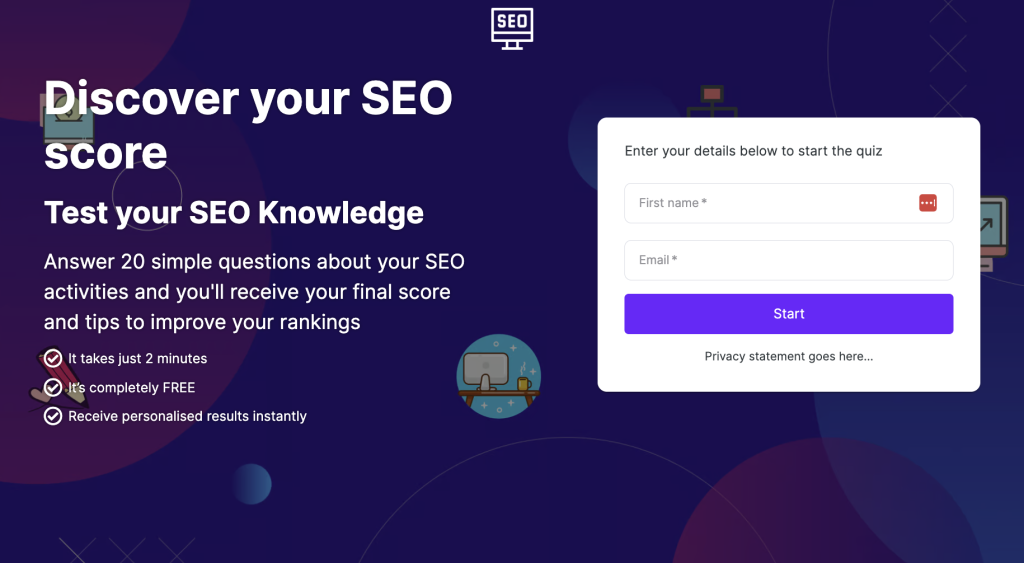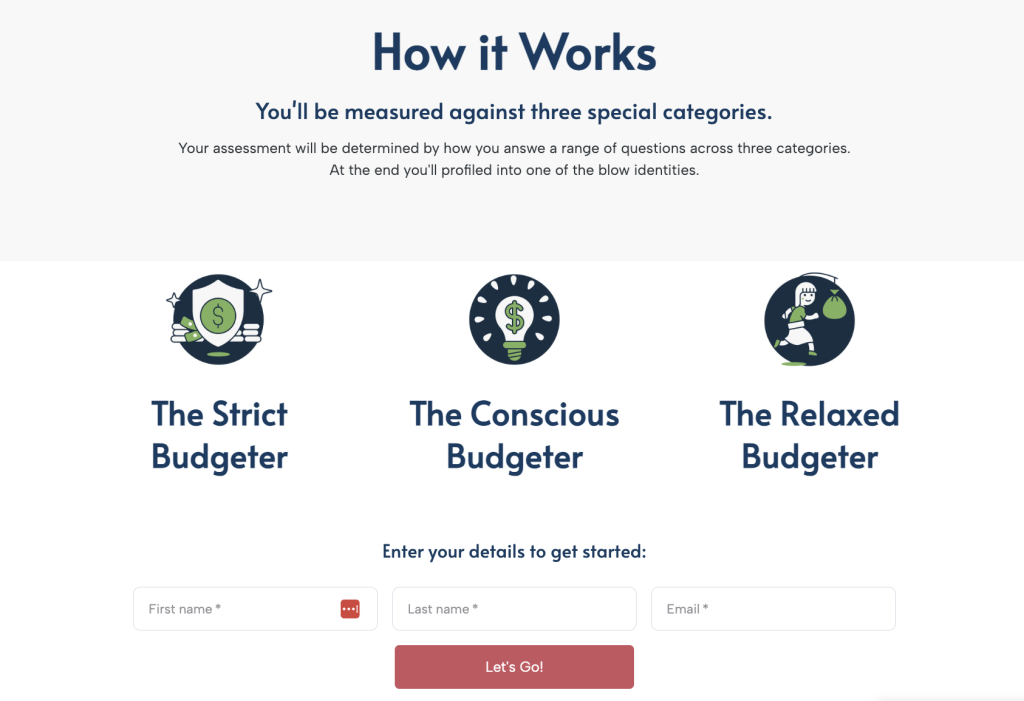Personality Quiz vs Scorecard Quiz: Which Should You Choose?


A quiz will grab your audience’s attention, encourage them to engage with you and collect plenty of data.
But what should YOU create: a personality quiz or a Scorecard quiz?
If you’re new to this, it might feel confusing.
After all, some elements do overlap – but they’re not the same. Personality and scorecard quizzes have different structures and goals.
Let’s look at what they are in practice, so that you can see what would work best for you.
What’s a scorecard quiz?
A scorecard quiz is an online test to measure someone’s knowledge or skills in a particular area.
They’re especially common in educational settings or for businesses that pre-qualify their leads (based on their current situation or understanding of their industry).

So, a scorecard quiz is about uncovering what each participant is already doing well – or knowledgeable about – and what they’re struggling with.
For example:
- “Get your free SEO report”
- “How’s your content marketing game?”
- “Health and fitness scorecard”
How are scorecard quizzes structured?
A scorecard quiz works like this:
- Questions – They’re eight ‘right or wrong’ or have a score attached
- Scorecard – It could be a grade, percentage, level of proficiency and so on. Either way, the quiz results are divided into categories: they show participants what they’re doing well and what they got wrong for each of them
- Next steps – The best scorecard quizzes tell your audience what they should do next. They include actionable advice and recommend the right solution (for example, one of your services)
What are the advantages of using scorecard quizzes?
Scorecard quizzes come with lots of benefits, especially if you need to test your audience’s knowledge or understand their situation objectively.
Knowledge assessment
Scorecard quizzes are built around this: measuring someone’s knowledge, skills or abilities.
And it’s helpful for both:
- The participant – They can understand their current situation and use the scorecard as a starting point to measure their progress over time
- You – You can see where someone is at right now and take it from there (instead of wasting time with a generic approach)
Objective evaluation and immediate feedback
Scorecards aren’t subjective: they’re based on right-or-wrong answers and specific scores.
So, they provide an objective way of assessing your audience’s abilities and knowledge.
Another huge benefit is that this happens in real time. Excellent for:
- Educational settings – You can test someone’s knowledge and give them instant results
- Lead magnets – No more expecting people to download a PDF resource and actually go through it!
Motivation and encouragement
They know they’ll receive some kind of score. So, your audience will be compelled and motivated to engage with your material properly.
Plus, you’ll also show them what they’re already doing well – not just what they got wrong (and who doesn’t love a confidence boost?).
Once again, this is all super helpful as part of a learning process and to get better-fit leads.
Identify gaps
In this case, scorecards are more effective than quizzes with standalone percentages. Why?
Because they’re divided into categories. So, they’ll show a participant exactly what they need to focus on to improve.
They can also recommend the right next steps: what to study, what service they should consider, what they must put in place before investing in your business and so on.
Easy to share and scale
Participants can take a scorecard quiz:
- At the same time – Perfect for educational settings or to get an audience engaged at an event
- Individually and at their own pace – Ideal as a lead magnet for your business
Easy data collection
You’ll be asking lots of strategic questions to understand someone’s situation or knowledge. Well, guess what?
It’ll result in a GOLDMINE of information!
So, for example, you can use a scorecard quiz to:
- Really get to know your audience
- Measure the effectiveness of a course, programme or training session
- Guide your future lessons or marketing efforts
When are scorecard quizzes NOT appropriate?
A scorecard quiz might not be the most logical choice if you need to:
- Learn more about personal attitudes, beliefs and feelings (so, more subjective topics) or do so in a way that covers different cultures
- Encourage problem-solving
- Assess teamwork, collaboration or discussion
What’s a personality quiz?
A personality quiz is an online test to reveal something about the participant’s character, preferences or – as the name suggests – personality traits.

They’re not about ‘right or wrong’ answers but rather more subjective. So, personality quizzes are popular to encourage self-discovery and promote engagement on websites and social media.
For example:
- “What type of entrepreneur are you?”
- “Learning style quiz: how do you learn?”
- “What Disney characters are you most like?”
How are personality quizzes structured?
Personality quizzes are usually structured like this:
- Questions – These are geared towards understanding the participant’s behaviour, preferences and attitude. They’re not ‘scored’ because… there’s no right or wrong answers! Instead, they assign them to a different profile or outcome
- Results – A participant’s answers will reveal what profile or personality type they match. So, they’ll get a descriptive outcome that’s usually enlightening or fun (or both!)
- Personalised content – These quizzes can also include recommendations for each personality type (like the best product) or encourage them to share their results on social media
What are the advantages of using personality quizzes?
Personality quizzes are great for engagement, subjective topics and more informal settings. But let’s dive deeper into their core benefits.
Easy engagement
These quizzes have an intriguing title, they can be fun and light-hearted AND they promise a more personal result.
So, they’re ideal to grab your audience’s attention and get them to interact with you – and even share their results afterwards.
Perfect for businesses looking to increase engagement, brand awareness and email subscribers!
Self-discovery
Personality quizzes are attractive because they help people learn more about their behaviours, traits and preferences (and let’s face it: who doesn’t love answering questions about themselves?).
So, they’re helpful for both:
- Participants – They’ll understand what personality traits they have or what profile they fit in with
- You – You’ll learn more about your audience. You can then segment them into different groups (based on their answers and personality type) and nurture them accordingly
Ice-breakers
Personality quizzes are more fun and informal!
Think about those awkward situations where you never know how to kickstart a meeting or event (from social settings to team-building activities).
A lighthearted personality quiz can really break the ice! No ‘right or wrong,’ no pressure. And you’ll get people to engage and connect with you right from the start.
Personalised content
Well, it’s in the name! Personality quizzes are all about personal results (which people LOVE).
You can also use them to send relevant content or recommendations based on their personality type. For example, the best activity, resource, product or service for them.
Data collection
It’s not just your audience learning more about themselves: you will get to know them better, too!
What are their preferences and tendencies? What are they most interested in?
You can then use these juicy insights to inform your marketing strategies, product development and customer service approach – and set yourself up for success (high five!).
Non-evaluative
Personality quizzes are more subjective and lighthearted.
Because there’s no ‘right or wrong’ answers, participants will be more inclined to take part and actually be honest.
When are personality quizzes NOT appropriate?
A personality quiz wouldn’t be the best choice if you’re focusing on:
- Clinical or psychological evaluations
- Formal education or academic research
- Professional development
So, how do you choose which quiz type to use: personality vs scorecard quizzes?
As you now know, both types of quizzes are engaging, effective and ideal to gather lots of data. So, it all depends on your main goal:
- If you need to assess someone’s knowledge or situation, I recommend a scorecard quiz: objective, outcome-based and built on ‘right or wrong’ answers
- If you want to learn more about their character or traits, then you should try a personality quiz: subjective and all about self-discovery
All clear?
Now, let’s make it happen!
Create your scorecard or personality quiz with ScoreApp
Yes, you can use our intuitive quiz builder for both.
And the best part? You can easily get started today and for FREE. Time to create and launch your strategic personality quiz or scorecard!



